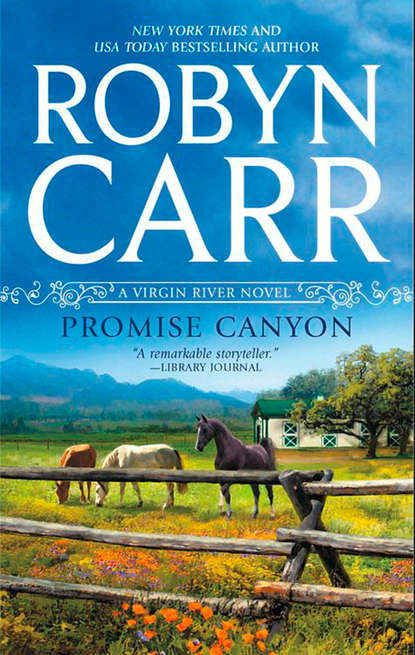По всем вопросам обращайтесь на: info@litportal.ru
(©) 2003-2025.
✖
Promise Canyon
Автор
Год написания книги
2019
Настройки чтения
Размер шрифта
Высота строк
Поля
“You’re going to take her to Nathaniel’s?”
“Lilly, it’s for the convenience of dealing with her condition, not to give her a new home. Nate didn’t want to transport her until she was more stable and I think we’re just about there, but that doesn’t guarantee her recovery. If she doesn’t improve, he won’t let her go on like this, in pain.”
“I understand.”
“What were you going to do out here at night?”
“I don’t know. Eat my sandwich. Be with her, I guess.”
He tilted his head. “Do you have horses?”
She shook her head. “Never have, but when I was real young I rode some. Well, it’s been a long time, but when I was a kid, I was surrounded by them. Back on the reservation. I’ve ridden with Annie a few times, but I’m not around horses much, just when I deliver their feed. Finding her like this, it kind of made me responsible in a way. At least for making sure she wasn’t alone.”
“It could be midnight before she’s either better, worse, ready to transport or …” He didn’t finish.
“I brought a jacket and a—” She felt silly about the sleeping bag. Did she really plan to lie on the ground next to a twisting, kicking horse through the night? Even in August, in the mountains or surrounded by them, it was cold after dark. “I’d be willing to share the sandwich,” she said. “Who knows, you might not get pot roast delivery for a long time.”
“I don’t know. I feel like I’m taking a chance on a mushroom sandwich.”
“You might actually like it. Hey, you aren’t planning on leaving this horse in the pasture, are you? Because, if I remember, she can’t be grazing. Isn’t she off food?”
“I’m on top of it, Lilly. The barn and corral where she was kept—Nathaniel looked at it and it’s out of the question. It’s filthy, cluttered, the fence in poor condition. Once she takes a turn for the better, I’m going to take her to Nathaniel’s clinic. And until she’s feeling a lot better, believe me, I won’t let her graze. She’s miserable.”
“Yeah,” Lilly said, connecting with the mare’s eyes. “Be right back,” she said. She jogged toward her Jeep. With her hands on a fence post, she put one booted foot on the top barbed wire, pressed down and jumped over. Getting back over the fence was slightly more difficult—her hands were full of food and drink. “Bottled water or apple juice?” she asked him.
“You first,” he said. “I have a couple of warm colas in the truck.”
She smirked and handed him the apple juice. “This is much better for you. And hold these, please.”
“Nuts?” he asked.
“Also good for you, as is the half sandwich.”
“I don’t know ….”
“Be a big boy,” she said, and then thought, he is really such a big boy! But she kept her eyes cast down and opened the wrapping of her sandwich. She’d already cut it in half, thankfully. She put her water on the ground and traded with him—sandwich for bags of nuts. “Think she’ll let us sit down?” she asked.
Clay dropped the rope and backed away. “Better give her space. She isn’t thinking about her human friends right now. She could drop on you and grind you right into the pasture.”
Lilly followed him about ten feet away from the mare, then carefully sat. “I probably have a … a blanket or sleeping bag in the Jeep ….” She still couldn’t admit to planning to sleep beside a sick horse she had no real connection to.
“Yeah, me, too,” he said. “But the ground is dry enough.” Down he went, crossing his legs. “And so. We have a mushroom sandwich.”
“One of my favorites,” she said. “What brought you to Nate’s practice?” With the question, she bit into hers.
“I have family nearby. A married sister with a family in Grace Valley. And if you come from the mountains, the cold mountains at about seven thousand feet, Los Angeles County is a little low, hot and smoggy. Even out in the hills.”
“Why don’t you just go back to Flagstaff?”
“Because there’s no opportunity in Flagstaff. Do you know how many Northern Arizona U PhDs are waiting tables there because they just can’t make themselves leave? And God knows there aren’t any rich horse breeders looking for help on the reservation. Nah, this is pretty, around here, and close to family, and Nathaniel is good people and he’s offering me a terrific opportunity to help grow his business. How’d you end up here?” he asked. And then he bit into his sandwich. He chewed a bit, then winced and made a face.
She couldn’t help it—she laughed and covered her mouth with her hand.
“How do you eat this?” he asked.
“I like it,” she said, still laughing. “Give it to me. Eat nuts, that’ll hold you awhile.”
“So?” he asked, passing the sandwich back.
“So my grandma died and a few years later my grandpa heard through a friend that the feed company was for sale and he thought he could make it work. He’d always wanted his own business. And it was just him and me, so …”
“Where are your parents?” he asked.
“Anyone’s guess,” she answered, filling her mouth again.
He let her chew. He piled nuts in his mouth while she worked on her mouthful. When she had finally swallowed, he asked, “So, are you …?”
“Grandpa and I moved here when I was thirteen and I think it was the right move,” she said, cutting off his next question. “Because I did well in school, made new friends, and although Yaz will never admit it, he’s making money on silage and hay.” She laughed and shook her head. “Don’t try to trick an old Hopi into telling you what he’s got in his pocket. He’s crafty.”
Clay studied her for a moment, really wanting to know a lot more about her and fully aware she was keeping her answers impersonal. “I think maybe you’re crafty, too.”
She smiled as though she had a secret. “I have been trained by the best.”
She bit into her sandwich and the mare farted.
“Well, that was nice,” Lilly said. “Very ladylike.”
Clay laughed at her. “Music to my ears,” he said. He stood up. “I think she’ll be going in the trailer real soon. I think what you call that in veterinary medicine is progress.”
Lilly hated the idea of ending the conversation even if it was getting a little close for comfort for her. “Shouldn’t you wait until you’re sure that blockage clears?”
“As long as she’s not in pain and there’s progress, I’ll be more than happy to hose out the trailer when I’m back at the clinic.” He stood and went to the mare, took the lead rope and led her to the fence. He pulled a small wire cutter out of his back pocket and made fast work of the barbed-wire fence. Once cut, the wire sprang away and gave them an exit. Why worry about the pasture’s security now? The owners had clearly fled.
But he turned toward Lilly. She cradled all her picnic stuff in her arms—nuts, remaining sandwich, bottles …."That was so nice, Lilly,” he said. “So nice that you’d worry about the horse and come to be with her. And so nice that you’d share your meal with me.”
“Even though it was a mushroom sandwich?” she asked.
When he looked at her, his brows relaxed and his eyes seemed to darken. “Even though,” he said.
Then he made clicking noises and said, “Come on, precious. Let’s get you outta here ….” And he led her to the trailer.
Three
Colic, a term that covered a litany of equine intestinal disorders from a bowel obstruction to twisted intestines, was one of the most common and dangerous illnesses in horses. If diagnosed early, treated quickly and if it wasn’t the critical variety that required surgery, the prognosis was typically good.
Clay delivered the mare to the Jensen stable and reported improved gut sounds and even a little excrement in the trailer, evidence that there was some digestive action and the blockage might clear. Luckily for him, he was able to wash up, sit down to some of Annie’s fantastic pot roast and visit with his friends before the worst of the horse’s recovery happened in the stall. When he returned to the stable, he could have sworn the mare was smiling.
“Well,” he said. “Feeling better?” She saw him and whinnied. “Tender belly, I’ll bet. And Nathaniel’s records of his single visit to the Jerome house indicate your name is Blue Rhapsody. You’re a beauty. Must’ve half killed them to leave you behind.” Then he shook his head and muttered, “Things must’ve gotten real bad around the old homestead.”













